Women's Tour of Flanders: Facts and figures
Stats and stories from the one-day women's Classic
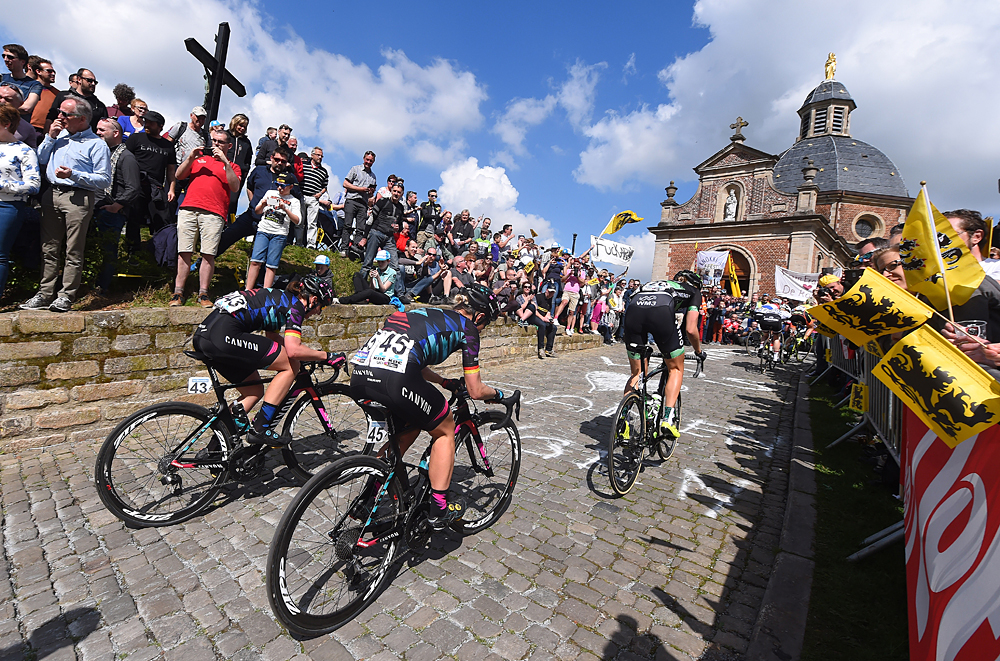
Although the men's Tour of Flanders dates back to 1913, it wasn't until 2004 that the women had an opportunity to tackle some of the same steep, cobbled climbs and show their prowess in floating over the cobbles.
The first edition was part of the now-defunct UCI World Cup for women and has grown with the peloton, joining the Women's WorldTour when it was created in 2016.
The first edition was short - just 94km long - but the women climbed the Muur van Geraardsbergen and Bosberg to finish in Meerbeke, the same finale as the men's race, making it the first opportunity for the women to join their male counterparts on the biggest stage.
Since then, the race has given a platform to shine to the top names in women's cycling, from Miriam Melchers, Nicole Cooke, Judith Arndt and Ina Teutenberg to Marianne Vos, Annemiek van Vleuten, Lizzie Deignan and Anna van der Breggen.
Cyclingnews dug into the archives to pull out the facts, figures and stories that have shaped the Women's Tour of Flanders over the past 16 years.
Most wins - Miriam Melchers, Judith Arndt
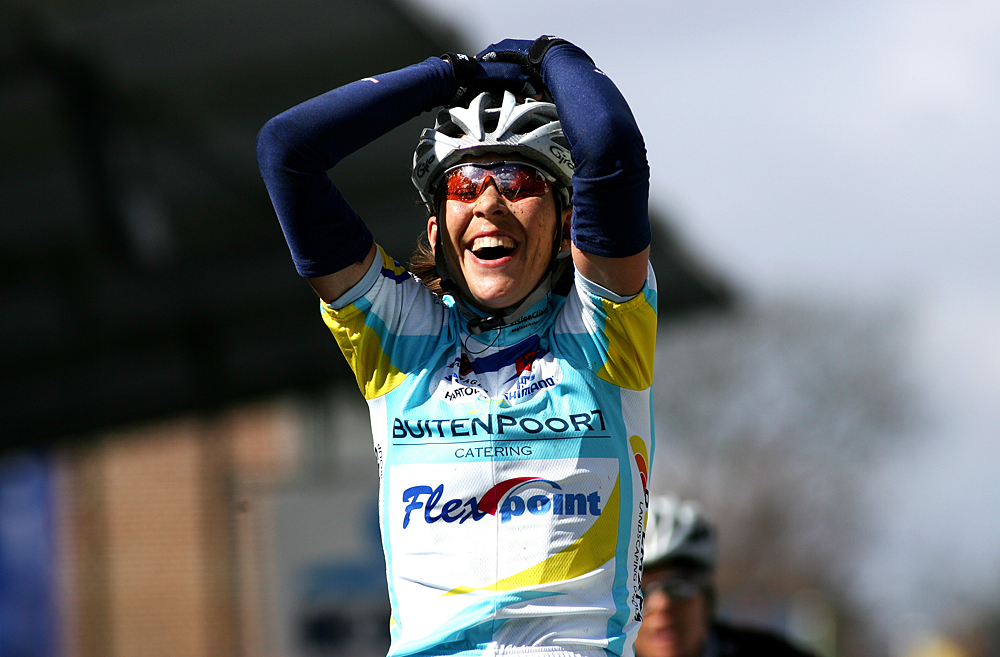
There are only two double winners in the race's history - Miriam Melchers van Poppel and Judith Arndt, with the last double completed in 2012. Since then it's been a new name every year.
Melchers won the race back-to-back in 2005 and 2006, taking both editions in a two-up sprint. In 2005, the Dutchwoman made a gutsy move to attack before the race entered Geraardsbergen, getting a 15-second lead before her teammate Susanne Ljungskog bridged across over the top of the Muur. With the two-time world champion to help, the pair carved out a 35-second gap over a large chasing group.
Get The Leadout Newsletter
The latest race content, interviews, features, reviews and expert buying guides, direct to your inbox!
Then, drama struck - the chasers were directed the wrong way on the course and ended up crossing the finishing line going the wrong way and were all given DNFs. It was a disaster for the World Cup standings and riders were furiuos.
The next year things went much smoother, and Melchers attacked from even further out - not even halfway through the race on the Haaghoek section of cobbles. After the Valkenburg, she had ditched her two breakaway companions and soldiered on for more than 30km before finally being caught by Christiane Soeder, but the Austrian was unable to match Melchers in the sprint.
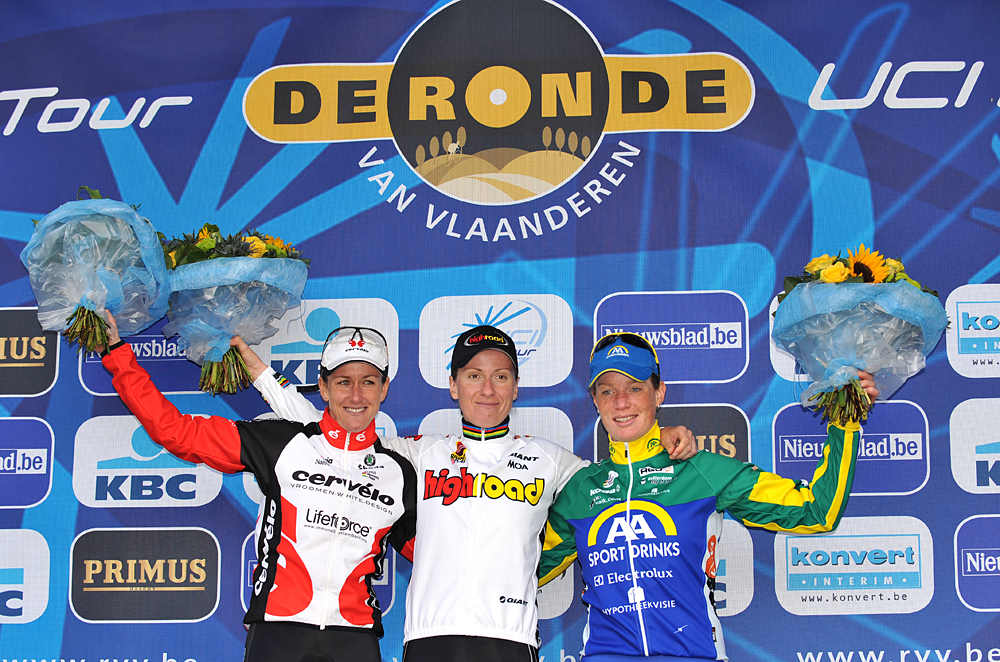
Arndt scored her first victory in Tour of Flanders in 2008, parlaying fine teamwork by Highroad into the win. Arndt bridged across with a group on the Muur to join several teammates in the breakaway. After the Bosberg, soon-to-be Olympic champion Kristin Armstrong put in a vicious attack that only Arndt could follow. The German handily out-sprinted the American.
Another Olympic year and almost the same scenario played out in 2012, this time on the new closing circuit with the finish in Oudenaarde. This time Armstrong's attack came in the Oude Kwaremont and again, Ardnt latched on and then out-sprinted her.
Arndt and Melchers remain atop the medal table with their two wins, although Marianne Vos has been on the podium the most, winning the race in 2013 with a similar attack on the Oude Kwaremont that drew out Ellen van Dijk and Emma Johansson. Vos was second in 2010 and third twice (2007 and 2011).
| Pos. | Rider Name | 1st | 2nd | 3rd |
|---|---|---|---|---|
| 1 | Judith Arndt | 2 | Row 0 - Cell 3 | Row 0 - Cell 4 |
| 2 | Mirjam Melchers | 2 | Row 1 - Cell 3 | Row 1 - Cell 4 |
| 3 | Marianne Vos | 1 | 1 | 2 |
| 4 | Annemiek van Vleuten | 1 | 1 | 1 |
| 5 | Elizabeth Deignan | 1 | 1 | Row 4 - Cell 4 |
| 6 | Ellen van Dijk | 1 | 1 | Row 5 - Cell 4 |
| 7 | Zulfiya Zabirova | 1 | 1 | Row 6 - Cell 4 |
| 8 | Anna van der Breggen | 1 | Row 7 - Cell 3 | 1 |
| 9 | Coryn Rivera | 1 | Row 8 - Cell 3 | Row 8 - Cell 4 |
| 10 | Elisa Longo Borghini | 1 | Row 9 - Cell 3 | Row 9 - Cell 4 |
Most finishes - Kirsten Wild
Kirsten Wild has raced the Tour of Flanders the most, taking part in 13 of the 16 editions. The 37-year-old raced it for the first time in 2005, and has started every year since except for 2016 and 2017. Wild landed on the podium three years in a row - 2008, 2009 and 2010 - and was fourth in 2012.
Trixi Worrack raced 12 times, while five riders have competed 11 times: Chantal Blaak, Johansson, Tatiana Guderzo, Rasa Leleivyte and Annemiek van Vleuten.
| Pos. | Rider Name (Country) Team | Result |
|---|---|---|
| 1 | Kirsten Wild | 13 |
| 2 | Trixi Worrack | 12 |
| 3 | Chantal van den Broek-Blaak | 11 |
| 4 | Emma Johansson | 11 |
| 5 | Tatiana Guderzo | 11 |
| 6 | Rasa Leleivyte | 11 |
| 7 | Annemiek van Vleuten | 11 |
| 8 | Ellen van Dijk | 10 |
| 9 | Lucinda Brand | 10 |
| 10 | Marta Bastianelli | 9 |
Nearly woman - Emma Johansson
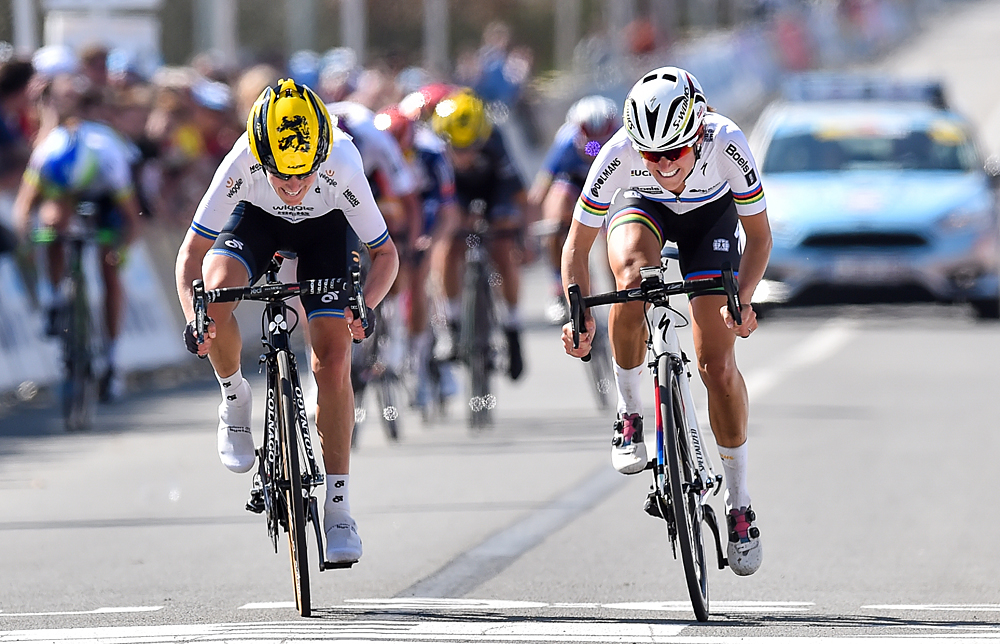
Emma Johansson won some 67 races over the course of her career but never the Tour of Flanders. She's been frustratingly close including a millimetre-sprint defeat at the hands of Lizzie Deignan in 2016. Johansson also finished third three times and fourth twice - inside the top 10 seven times without a win - to make her the nearly woman of the Tour of Flanders.
| Pos. | Rider Name | Top 10s |
|---|---|---|
| 1 | Emma Johansson | 7 |
| 2 | Chantal van den Broek-Blaak | 6 |
| 3 | Loes Gunnewijk | 5 |
| 4 | Kirsten Wild | 5 |
| 5 | Katarzyna Niewiadoma | 4 |
| 6 | Noemi Cantele | 3 |
| 7 | Susanne Ljungskog | 3 |
| 8 | Adrie Visser | 3 |
| 9 | Megan Guarnier | 3 |
| 10 | Christiane Soeder | 2 |
Youngest winner - Elisa Longo Borghini, 23
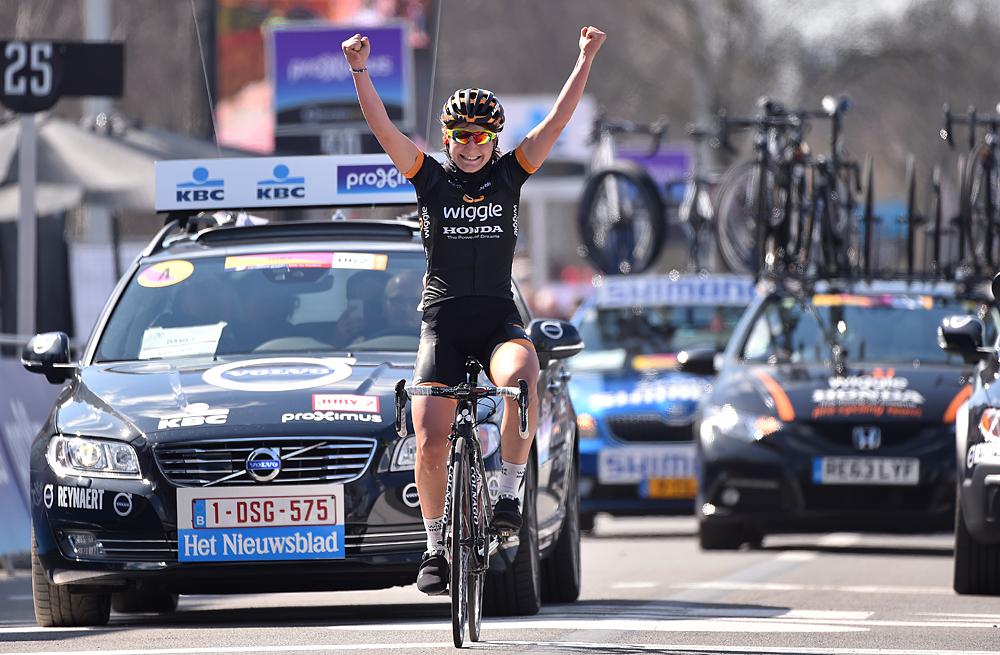
Elisa Longo Borghini became the race's youngest winner in 2015 at the age of 23 and 115 days. The Italian had a confidence-boosting fourth place the year before and when the race reeled in Annemiek van Vleuten on the Kanarieberg and the race became increasingly nervous, Longo Borghini made her move.
An Italian time trial champion, Longo Borghini powered over the last 20km with all the favourites alternatively chasing full out and marking each other. The combination worked to the solo attacker's favour and she held a 43-second lead by the time she celebrated her victory ahead of Jolien D'Hoore and Van der Breggen.
Nicole Cooke is the second youngest rider to win the race, taking the win in 2007 just days before her 24th birthday.
Oldest winner - Judith Arndt, 35
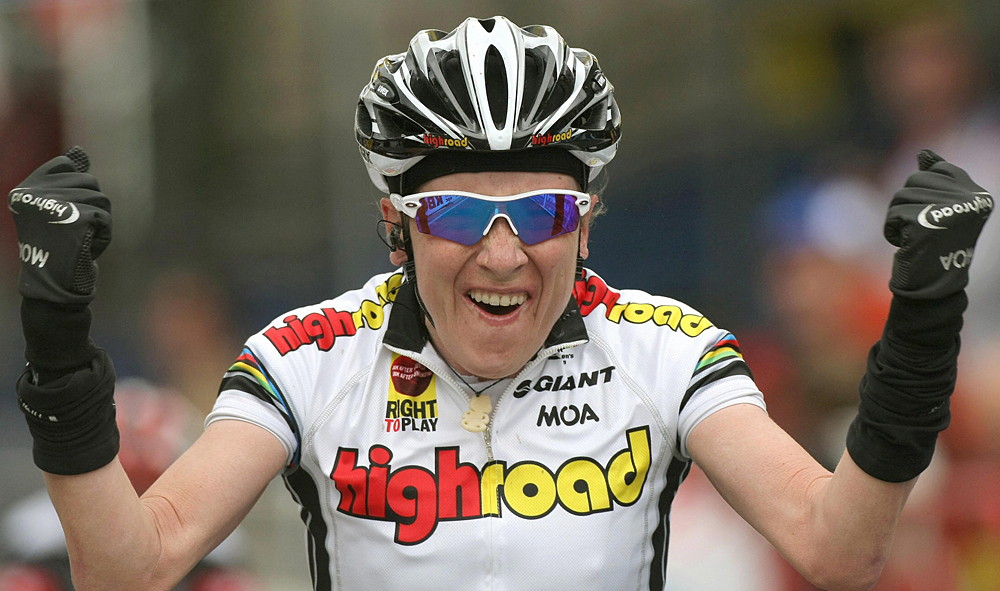
Arndt was in the last year of her career in 2012, working mainly toward the Olympic Games in London, but the Classics were part of her bid to ensure selection to Germany's team. Coming into De Ronde, she'd won a stage in the Ladies Tour of Qatar and the Women's Tour of New Zealand but had a frustrating fourth place at the Trofeo Alfredo Binda.
However, the new finish of the Tour of Flanders was straight up her alley, and Ardnt, after escaping with Armstrong, handily out-sprinted her rival.
Fastest edition - 2004
The first year was the fastest at 38.63kph, not coincidentally the shortest edition of the race. At just 94km, the race was fraught with attacks with a large group of favourites forming before the Muur. Russian Zoulfia Zabirova launched the race-winning move on the Muur and held off Worrack and Leontien van Moorsel to claim the solo victory.
Slowest edition - 2006
2006 was the slowest at 34.12kph when Melchers won her second title, the pace hampered by slick, wet cobbles in the early kilometres. Only 50 or so riders were left in the front group after just 24km after the 2.4km-long stretch of pave on the Paddestraat.
The race came further apart after the mid-point when Melchers made her move, joined for a short time by American Kim Anderson and Edwige Pitel. The field exploded, making for a tough slog across Flanders.
How the race was won
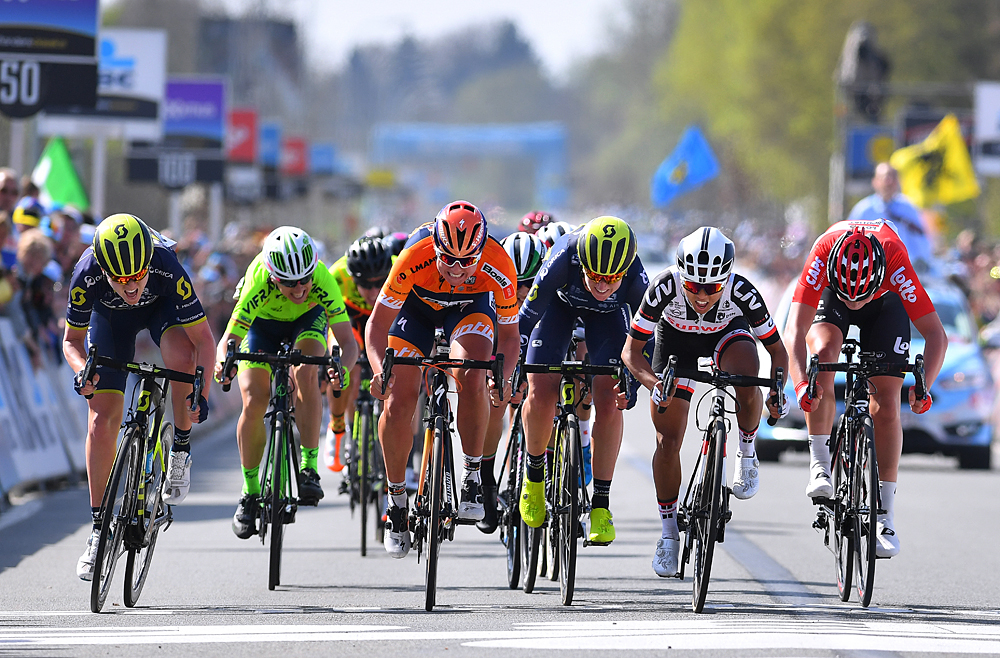
There have been 10 solo victories over the 16 editions, two from Melchers (although the gap given was minimal and technically a two-up sprint). Most of the years the race comes down to a two to three-rider sprint, but in two editions - 2009 and 2017 - there was a rather large bunch sprint.
In 2009, the women's Tour of Flanders came down to team tactics, with Marianne Vos and Nicole Cooke attacking on the Muur but being chased down by the stronger Cervelo Test Team. It was Ina Teutenberg who profited the most, however, tagging onto the chase and then out-sprinting Kirsten Wild (Cervelo) to take the win out of the group of 18.
An even bigger group formed in the final kilometre of the 2017 edition, when a 15-rider chase group caught a four-rider breakaway with one kilometre to go. American Coryn Rivera unleashed a vicious turn of speed to take the win ahead of Gracie Elvin and Chantal Blaak, the biggest victory of her career.
Biggest Winning Gap - Anna van der Breggen, 1:08
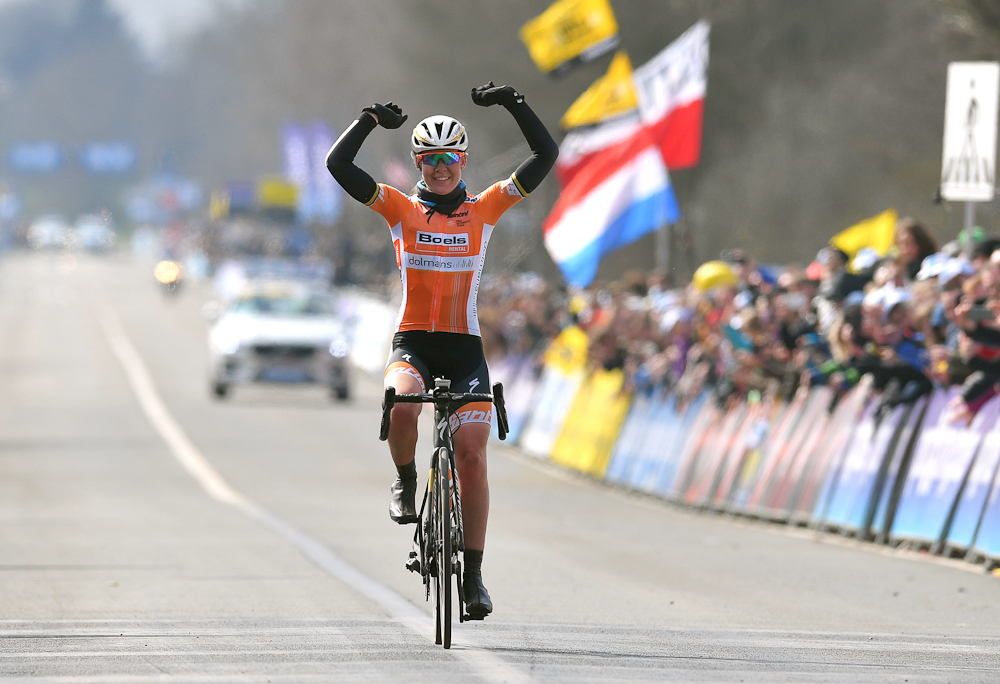
Anna van der Breggen has shown time and again she is comfortable going solo, and the 2018 Tour of Flanders was no exception. She attacked on the Kruisberg with 25km to go and was never seen by her rivals again. Over the Oude Kwaremont and Paterberg, she extended her lead and eventually finished 1:08 ahead of the chasers
Average Speed - 37kph
The overall average speed for the 16 editions was right at 37kph, but as the distance limits set by the UCI have been relaxed for women, the race has become longer almost every year. Starting out at just 94km, the race is now almsot 160km long.
Despite the added distance, the speeds have remained above average since the race joined the WorldTour, except for 2018 when it was slightly slower than average.

Laura Weislo has been with Cyclingnews since 2006 after making a switch from a career in science. As Managing Editor, she coordinates coverage for North American events and global news. As former elite-level road racer who dabbled in cyclo-cross and track, Laura has a passion for all three disciplines. When not working she likes to go camping and explore lesser traveled roads, paths and gravel tracks. Laura specialises in covering doping, anti-doping, UCI governance and performing data analysis.